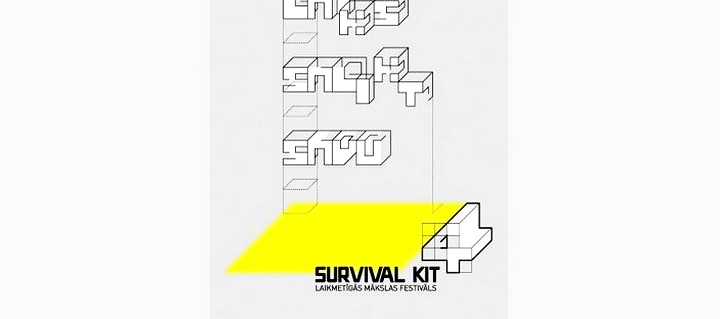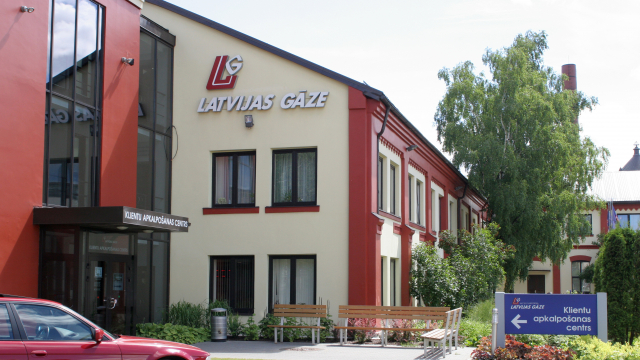“Survival Kit” will take place at two venues in Riga this year: in Wagner Hall in Riga’s Old Town and in the former textiles factory “Boļševička” at Ganību dambis 30. More than seventy artists from 25 countries will participate in the festival this year.
The festival is organised by the Latvian Centre for Contemporary Art and curated by Solvita Krese, the Director of the Latvian Centre for Contemporary Art, and Aneta Szylak, Director of the art festival “Alternativa” in Poland.
The former “Boļševička” textiles factory building was constructed in the early 20th century as the “Bufalo” leather shoe factory. “The building is a prominent example of industrial architecture and the embodiment of the ideas of rationalism,” comments art historian Silvija Grosa.
During the festival, the former textiles factory building will be the venue for a major contemporary art exhibition, presenting works by Latvian artists Ēriks Božis, Inga Erdmane, Katrīna Neiburga and Andris Eglītis, Kirils Panteļejevs, Kristīne Alksne, Laura Ķeniņš, Reinis Hofmanis, Vilnis Putrāms and Vladimirs Jakušonoks, as well as Alicja Karska & Aleksandra Went (Poland), Andreas Angelidakis (Norway, Greece), Anouq de Clercq (Belgium), Grzegorz Klaman (Poland), Hiwa K (Iraq), “Isola Art Centre” (Italy), Julita Wojcik (Poland), Jun Yang (China), Katarina Lundgren (Sweden), Łukasz Surowiec (Poland), Mariam Natroshvili & Detu Jintcharadze (Georgia), Nir Evron (Israel), collective “Predmetiv” (Ukraine), Aglaia Konrad (Belgium), Timo Toots (Estonia).
Wagner Hall, a building on Vāgnera iela in Riga’s Old Town where the German composer and conductor Richard Wagner worked in the 1830s, currently remains empty and unused, as the Ministry of Culture has no funds for reconstruction of the building.
Participants in the exhibition at the Wagner Hall include Latvian artists Aleksandrs Zapoļš and Līva Rutmane, Alnis Stakle, Amanda Ziemele and Margrieta Dreiblate, Artūrs Punte, Evelīna Deičmane, Iliana Veinberga and Ainārs Kamoliņš, Ināra Gauja, Jānis Taurens and Reinis Dzudzilo, Klāvs Upaciers and Inga Ģibiete, Laura Feldberga, Linda Konone, Mārtiņš Roķis, as well as “Alte Schweden” – Joakim Hansson and Sebastian Mügge (Sweden), “Poetic Robotism” – Laura Prikule and Eva Vēvere (Latvia), Augustas Serapinas (Lithuania), Bárbara Wagner & Benjamin de Búrca (Brazil/Germany), Catalina Niculescu (Romania), Janin Walter (Germany), Jesper Just (Denmark), Lawrence James Bailey (the Netherlands), Maidera Lopesa Maider López (Spain), “Topp& Dubio” (the Netherlands), “Visible Solutions” (Estonia).
A variety of other events will also be held during the festival. One is the international symposium “Urban Utopia: Art and Culture as a Tool for Exploring and Researching a City”, which will take place from the 12th to 14th of September. Foreign lecturers and local experts will focus on a variety of areas which affect the urban environment – anthropology, sociology, philosophy and others. The co-curator of the symposium is Jonas Büchel, Director of Urban Institute Riga.
Japanese artist Ryoji Ikeda’s audio visual concert “datamatics [ver.2.0]” will be held at the “Splendid Palace” cinema on September 7th. In his works, Ikeda, one of Japan’s most famous electronic music authors, focuses not only on the most characteristic features of sound, but uses light as a substance and mathematics as a method just as successfully. “datamatics” is a long-term project that consists of a number of parts – moving image, sculptural elements, sound and new media technology. The visionary nature of the artist’s works stimulates one’s imagination about a future model of the utopian city.
Members of the general public are invited to participate in several creative workshops. Creative association of curators “TOK” will hold the workshop “Art in Public Spaces: Theory and Practice” at “Brasalona”, Gaujas iela 5, on the 5th of September, where engaging specific communities, building up and forming collective memory, and the revitalization of neglected urban zones will be discussed.
From the 17th to 21st of September, stage director Konstanze Schmitt from Berlin will host a creative workshop encouraging discussion about the possibility of a social utopia today, including in Latvia, by analysing the futurist visions of the Soviet avant-garde. The goal of the workshop is to stimulate discussion between different generations, talking about real life experiences and avant-garde utopias, bearing in mind that people’s biographies will always contain experiences that are at odds with ideologies and perceptions.





























